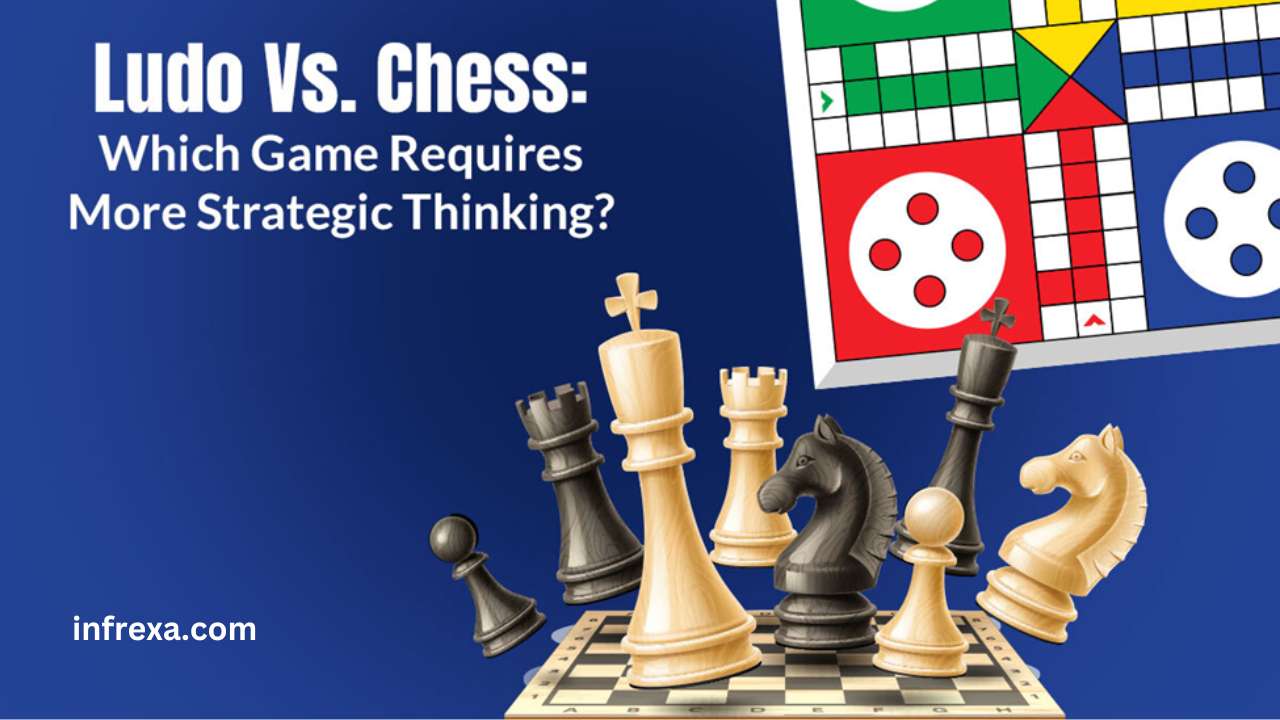Two classic board games symbolize strategic thinking: Ludo and Chess. While worlds apart in complexity and history, these games share the common thread of demanding players to flex their intellectual muscles. They make players focus, plan, and execute moves with precision, but they do so in distinct ways.
Ludo often plays the role of a friendly, social pastime in the bustling world of board games. Its colorful board and simple rules make it a staple at family gatherings and casual game nights.
When you Play Ludo Online, it will thrill you with unpredictable dice rolls, testing their ability to adapt to ever-changing circumstances. In stark contrast, Chess stands as the embodiment of strategic depth. With origins stretching back centuries, Chess is the ultimate test of intellect and foresight.
It presents players with a black-and-white battlefield where every move carries profound consequences, requiring both short-term tactics and long-term planning. Let us compare these two board games in terms of strategic thinking. Through this exploration, we aim to determine which game truly reigns supreme in strategy.
Understanding Ludo
Ludo, often regarded as the quintessential family board game, carries a sense of nostalgia and simplicity. It was known as Pachisi in ancient India. The name “Ludo” is derived from the Latin word for “I play,” reflecting its universal appeal. The rules of Ludo are refreshingly uncomplicated. Players roll a six-sided die and race their four tokens around a colorful, cross-shaped board to reach their respective home zones.
The first player to safely escort all their tokens home is declared the winner. It’s a game that can be learned in minutes, making it accessible to players of all ages. At first glance, Ludo might appear to be a game dominated by luck due to the reliance on dice rolls. However, dig a little deeper, and you’ll uncover layers of strategy.
Players must decide which token to move, whether to advance an existing token or launch a new one, and how to block or disrupt opponents’ progress strategically. Moreover, the unpredictability introduced by the dice roll adds a tactical dimension. Should you opt for a safer, slower strategy or take calculated risks for a quicker victory?
These choices make Ludo more than a mere dice roll—it becomes a psychological battle of wits. Ludo’s simplicity, combined with these strategic elements, makes it a beloved game that bridges generations. Its capacity to entertain and challenge players of varying skill levels is a testament to its enduring appeal.
Read this also: How to get Roblox Unblocked on your computer?
Understanding Chess
Chess is a timeless classic that people have loved for over a thousand years. It’s a bit of a mystery where it came from, but it might have started in India a long time ago, even before the 6th century. Since then, it’s traveled worldwide and become one of the most famous strategy games ever. The rules of Chess are fancy, but they make sense once you get the hang of them.
Each player has 16 pieces, like kings, queens, knights, rooks, bishops, and pawns. The main goal is to put the other player’s king in a tough spot called “checkmate,” where the king can’t escape being taken. It sounds simple, but the game gets tricky on the 64-square board. What’s impressive about Chess is that it’s all about thinking carefully.
Every move you make is like a well-thought-out plan, and each move impacts the whole game. Chess has different stages, like the start, where you set up your pieces and try to control the center of the board. Then comes the middle part, where you implement your plans and use excellent tactics.
Finally, there’s the end, where there are fewer pieces, and you need to be sneaky to win. What makes Chess extra special is how deep it is. It’s not just about tricks and moves; it’s about understanding different parts of the game, planning for several moves, and figuring out tricky positions.
Over hundreds of years, people have written tons of books, developed many strategies, and had famous matches. Even today, Chess is still a big deal with millions of fans and players worldwide, especially online.
Read this also: Play Game of the Week (Top Rated) free online Games
Comparing strategic thinking between Ludo and Chess
Ludo’s Strategy
- Ludo may seem luck-based with its dice rolls, but it involves strategy.
- Players must decide which token to move and when weighing risk and reward.
- Short-term tactics and adaptability are essential in reacting to changing board situations.
- The element of randomness in dice adds an unpredictable dimension, making long-term planning challenging.
Chess’s Strategy
- Chess is a strategy powerhouse.
- It’s all about precise, calculated moves; no luck is involved.
- Players control various pieces, each with unique abilities and roles.
- Strategy in Chess extends over several moves, requiring long-term planning and foresight.
- The goal is to outmaneuver your opponent, create threats, control the center, and ultimately checkmate the opponent’s king.
Comparative Analysis: Ludo’s Strategy Vs. Chess’s Strategy
- In Ludo, strategic choices revolve around token movement, risk management, and short-term tactics.
- In Chess, the strategy encompasses every move, requiring careful planning, piece coordination, and a multi-move outlook.
- While Ludo involves a mix of strategy and luck due to dice, Chess is entirely skill-driven.
- Ludo’s strategy is simpler and more immediate, focusing on adaptability.
- Chess is a cerebral challenge, honing critical thinking and strategic planning skills.
The Verdict
Which Game Demands More Strategic Thinking? Ludo is a game of strategy and chance, offering fun and social engagement. Chess is a profound intellectual battle, where each move results from skill and strategy.
The choice between the two depends on your appetite for strategic depth. Ludo is like a friendly chat, enjoyable and light-hearted. Chess is a profound debate that tests your strategic intellect and planning abilities.
Read this also: Now.gg TikTok: Use TikTok on Browser
Conclusion
In essence, while Ludo and Chess involve strategy, they cater to different levels of strategic thinking. Ludo is a game for casual enjoyment, offering a mix of strategy and luck, while Chess is the ultimate challenge for those seeking to sharpen their strategic minds with pure skill and calculation.
This is all about strategic thinking involved in Ludo and Chess. Pick your favorite and start your journey.




